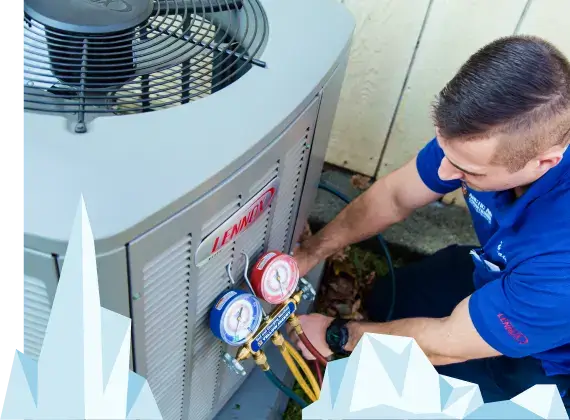Energy-Efficient A/c Solutions to Conserve on Energy Costs
As power costs proceed to rise, the relevance of energy-efficient Cooling and heating systems becomes increasingly noticeable. These systems not only assure substantial cost savings on utility expenses but likewise add to an extra lasting future by reducing power usage.
Advantages of Energy-Efficient A/c Solutions
Energy-efficient HVAC systems use numerous benefits that prolong past simple price savings. One considerable advantage is the decreased ecological impact. By taking in much less power, these systems add to lower greenhouse gas discharges, aiding to combat environment adjustment and promote sustainability. This aligns with boosting societal demands for environment-friendly techniques in household and industrial setups.
Additionally, energy-efficient cooling and heating systems commonly give enhanced comfort levels. A lot of these systems feature sophisticated innovation that permits for far better temperature level control and boosted air top quality (DMAKS HVAC). This brings about a much healthier interior atmosphere, which is particularly essential for individuals with allergies or respiratory problems
Furthermore, buying energy-efficient cooling and heating systems can boost home worth. As more customers focus on power effectiveness, homes and buildings equipped with these systems might bring in greater proposals in the real estate market.
Kinds of Energy-Efficient HVAC Options
How can property owners and services choose the most ideal energy-efficient a/c alternatives for their requirements? The market offers a selection of energy-efficient heating and cooling systems, each made to improve comfort while lessening energy consumption.
One choice is the variable cooling agent circulation (VRF) system, which effectively controls the temperature level in several zones within a structure. This system adapts its cooling agent flow to match the desired temperature level, causing significant energy cost savings.
Another preferred option is geothermal heatpump, which make use of the earth's stable temperature to heat and amazing areas. By transferring warm to and from the ground, these systems show excellent efficiency, specifically in moderate environments.
In addition, ductless mini-split systems supply an energy-efficient alternative for homes doing not have ductwork. These systems enable zone-specific home heating and cooling, minimizing power waste in vacant locations.
Lastly, high-efficiency heating systems and air conditioners, with sophisticated SEER and AFUE ratings, supply trustworthy environment control while consuming less energy than typical models. By examining these alternatives, property owners and businesses can choose a HVAC system tailored to their certain demands and energy performance goals.
Key Functions to Take Into Consideration

Following, investigate the kind of compressor utilized in the system. DMAKS HVAC. Variable-speed compressors can adjust their outcome to match the heating or cooling down need, causing improved comfort and power cost savings compared to single-speed designs. Additionally, try to find systems outfitted with clever thermostats that provide programmable setups and remote gain access to, linked here permitting much better control over power intake
One more vital function is the system's air purification capacity. High-efficiency filters can improve interior air top quality and lower power intake by guaranteeing the system operates effectively. Moreover, think about the kind of cooling agent made use of; modern-day systems usually use eco-friendly cooling agents that have a reduced ecological influence.
Finally, ensure that the system works with zoning technology, which allows for tailored temperature level control in various locations of your home, improving comfort while decreasing power use.
Tips for Picking the Right System


Next, think about energy performance scores, particularly the Seasonal Energy Performance Proportion (SEER) for cooling down systems and the Yearly Gas Use Effectiveness (AFUE) for heating unit. Greater rankings show higher effectiveness, which can lead to substantial cost savings on utility costs over time.
Furthermore, review the kind of heating and cooling system that best matches your way of life and budget. Alternatives include air conditioning, ductless mini-splits, and warmth pumps, each with its own collection of advantages and drawbacks.
Don't neglect the relevance of appropriate installation and sizing; an inaccurately sized system can cause inefficiencies and enhanced wear. Seek advice from with an expert Cooling and heating specialist to get expert referrals tailored to your home's special requirements. This extensive strategy will certainly guarantee that you pick an energy-efficient HVAC system that satisfies your demands and budget efficiently.
Upkeep for Optimal Effectiveness
As soon as the right a/c system remains in area, continuous upkeep comes to be essential to making try this out certain optimal effectiveness and long life. A well-maintained system operates better, leading to reduced power intake and reduced utility expenses. Routine assessments and tune-ups need to be set up at the very least two times a year-- when prior to the air conditioning period and as soon as prior to the home heating period.

House owners should additionally be attentive about checking their heating and cooling system's efficiency. Unusual sounds, fluctuating temperature levels, or enhanced power bills can indicate underlying concerns that require instant attention. By attending to these problems without delay, house owners can prevent expensive fixings and extend the life expectancy of their systems.
Purchasing an upkeep strategy with a qualified service technician not just enhances efficiency however likewise gives comfort, understanding that the system is operating at its ideal. DMAKS HVAC. Normal maintenance is as a result crucial for sustaining energy performance and decreasing general functional expenses
Verdict
Finally, energy-efficient a/c systems present a practical option for minimizing energy costs while enhancing comfort and air high quality. By integrating innovative modern technologies and alternatives such as geothermal heatpump and ductless mini-splits, homeowner can accomplish considerable energy cost savings and add to environmental sustainability. Mindful factor to consider of system features go to this website and ongoing maintenance additionally makes certain optimal efficiency, making energy-efficient systems a sensible financial investment for both financial and environmental benefits.